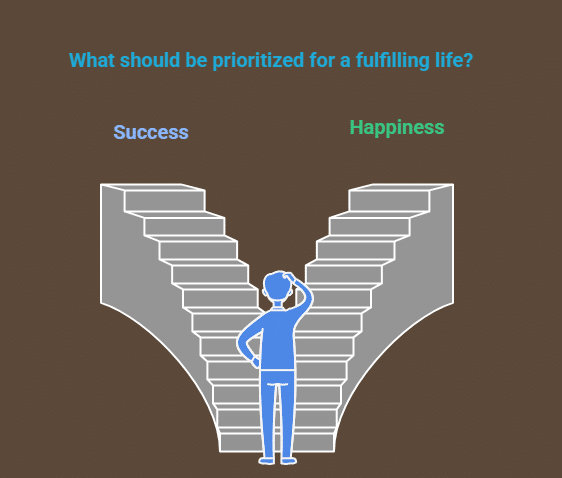In our society that values appearances and social media, wealth, fame, or material possessions often determine success.
Beneath the shiny exterior lies the profound truth that success isn’t always what you see.
Success needs to be more frequently understood.
We often get trapped into believing that success is solely based on what’s visible.

It’s time to dispel some misconceptions and explore the depths of what success truly means.
How Definitions of Success Have Changed Over Time
| Era | Definition of success |
| Agricultural Era | Success was often measured by owning land, having good crop yields, and being able to support your family and community. |
| Industrial Revolution | Success became more about how much you produced, having a stable job, and accumulating wealth. |
| Post-World War II Era | The “American Dream” saw success as owning a home, having a steady job, and moving up in the world. |
| Information Age | Success started to include achieving higher education, advancing in your career, and mastering technology. |
| 21st Century | Definitions of success have become more diverse, including work-life balance, personal fulfillment, social impact, and global connections. |
Success is Not Always What You See Meaning

Success is about purpose, personal growth, positive impact on others, and living in alignment with our values and passions.
Success is not always what you see. It is a subjective journey with many dimensions.
Every gain is facilitated by a sequence of trials.
Society overlooks or undervalues hidden triumphs.
Superficial markers aren’t the true meaning of success.
Notable accomplishments aren’t the only signs; kindness, personal triumphs, and healthy relationships also count.
Personal stability in all areas of life can bring fulfillment and challenge common beliefs.
Misconceptions, otherwise, lead to inadequacy or chasing empty and unsatisfying goals.
It’s time to shift our focus from external labels to internal fulfillment and embrace the achievements that genuinely matter.
The Unseen Struggles

While we are impressed by the success and glamour of accomplished individuals, we often forget the hardships they face.
Success is more than merely achieving fame, fortune, or acclaim. Instead, it combines persistence, motivation, and toughness amid adversity.
Behind every story lies a journey filled with unseen struggles and challenges.
It takes countless hours of toil and dedication in the background.
Like an iceberg, only a little portion is visible.
The bulk of the iceberg, comprising unseen efforts, setbacks, and perseverance, remains concealed beneath the surface.

This analogy aptly conveys the reality of success.
What do we commonly see:
- The LinkedIn promotion update.
- The victory trophy is being raised.
- The freshly released book is on display.
- The brand-new house or car.
- The graduation milestone or awarded degree.
These moments only scratch the surface of the full story.
The visible results that stand out and receive applause.
They’re tangible, photogenic, and easy to quantify.
Social media also amplifies the bias toward the end results, obscuring the process behind it.
This feeds the illusion that success is instant rather than a slow, steady grind.
However, celebrating only these achievements paints an incomplete and misleading picture of success.
Under these victories lies the hard-earned foundation, most of which remains unseen.
It’s built upon endless sacrifice, determination, and grit.
These are the moments when people experience self-doubt, rejection, failures, and setbacks.
Even those who exude confidence on stage or screen can secretly battle insecurities behind closed doors.
They question their abilities and worthiness of success while feeling the weight of others’ expectations.
The mental and emotional toll of pursuing success is often overlooked.
The actual work is rarely acknowledged.
It pushes one’s character and limits to the brink.
Many successful people struggle with anxiety, depression, and burnout, which often aren’t seen by others.
Understanding the iceberg principle of success isn’t just insightful—it’s liberating.
We allow ourselves to grow through failure, learning, and persistence.
Overcoming challenges demands a relentless commitment and an unwavering self-belief.
Character is formed in the quiet, private battles.
However, there are steps to reset after drifting off path.
In these times, individuals rise above their circumstances and reveal their true strength of character.
Success isn’t always what you see.
Acknowledge the bravery needed to overcome obstacles while striving for greatness.
Role of Failure

Success is commonly viewed as a straight path, with only outcomes serving as landmarks.
Failure is vital in shaping us toward success.
Disappointments inspire creativity and new ideas, pushing us to try without fear.
Success without struggles lacks depth.
The fear of failing can debilitate us from taking risks and pursuing our aspirations.
Failure shouldn’t be avoided or seen as something to be ashamed of.
Instead of resisting it, accept it as an essential feature of the way to greatness.
We must think outside the box to find new solutions when faced with obstacles or unexpected changes.
Failure can be a powerful catalyst for innovation.
We leave our comfort zones and take calculated risks.
Success is not always what you see. Many of the most successful people in history faced multiple setbacks and rejections before reaching their goals.
They realized that failure offers priceless lessons and insights that can’t be gained only from success.
Many groundbreaking inventions and successful businesses were born from initial failures or mistakes.
Here are some of the most inspirational Thomas Edison quotes:
“I have not failed. I’ve just found 10,000 ways that won’t work.”
Thomas Edison
“Our greatest weakness lies in giving up. The most certain way to succeed is always to try just one more time.”
Thomas Edison
“Many of life’s failures are people who did not realize how close they were to success when they gave up.”
Thomas Edison
Multiple defeats can teach us resilience, adaptability, and problem-solving skills, which build long-term success.
We can use our experience and wisdom to guide us towards better decision-making in the future.
We learn valuable lessons for success in all aspects of life.
When you fail, view it as a chance to learn and improve.
Success vs. Happiness: The False Equation

People believe success leads to happiness, but this is one of the biggest misconceptions in society.
Success and happiness are not the same and don’t flow from one to the other. Achievements may impress others but rarely bring deep, lasting fulfillment.
Let’s break down why this confusion exists—and why it matters.
The Cultural Myth
From a young age, we absorb a familiar formula:
- Climb the career ladder (titles, promotions, bigger responsibilities)
- Acquire more (houses, luxury items, financial wealth)
- Gain recognition (status, fame, social approval)
- = Happiness
It’s everywhere—advertisements, movies, graduation speeches. The message? Work hard, achieve success, and happiness will follow.
But life doesn’t always work that way.
Science tells a different story.
Studies show that once basic needs are met, like financial security, health, and safety, more money and status don’t necessarily make us happier. Consider:
- The Easterlin Paradox: Beyond a certain income, extra wealth doesn’t boost happiness much.
- Hedonic Adaptation: We quickly get used to upgrades in life, making them feel normal instead of exciting.
- High-achievers often struggle with anxiety, depression, and emptiness, despite reaching what society calls “success.”
Many people hit their career peak only to ask, Is this it?
The external rewards they worked so hard for don’t bring the inner piece they expected.
Chasing the Wrong Goals
This confusion results in optimizing life for external success. It pushes us to:
- Pick careers that look impressive instead of ones that truly excite us.
- Buy things to signal status rather than improve our daily lives.
- Build relationships that boost our image instead of nourish our souls.
The cost? Years or even decades spent chasing goals that feel empty in the end.
The Emotional Toll of Shallow Pursuit
More than a time sink, this mindset carries deep emotional consequences.
People who tie their self-worth to success often experience:
- Constant pressure—The fear that if they slow down, they’ll lose relevance.
- Imposter syndrome—Even after achieving success, they doubt if they truly deserve it.
- Fear of failure—Since their happiness depends on achievement, any setback feels catastrophic.
- Loneliness—When relationships are built around status, they often lack depth and authenticity.
This is why so many outwardly successful people struggle with mental health issues.
They’ve built a life designed for approval, not personal joy.
It’s a cycle that feels rewarding until it doesn’t.
Defining your own success

Success is not always what you see, and that’s precisely why defining your success matters.
Society sets its standards for success, which may not match everyone’s values or preferences.
Identify what matters to you to chart your course.
Setting goals that match your passions, interests, and values will bring you more joy.
People also read:
When Motivation Fails Discipline Prevails
When you define your success, it allows you to rejoice even small awards along your route.
Small daily progress is now also part of success. Remember that every step counts towards your goal, even during tough times. Regular tiny wins positively affect your self-concept.
The emphasis turns away from comparing yourself to others and towards personal growth and progress.
With this perspective, prosperity becomes a continuous journey rather than a distant goal.
Defining success for yourself gives you space to grow and feel a genuine sense of accomplishment based on your values.
Here are practical ways to manifest excellence:
1. Document Your Personal Success Metrics
Track what’s most important to you:
- Create a Success Journal: Log daily habits, learning milestones, and invisible wins.
- Develop a Personal Dashboard: Use visual tools to monitor progress, focusing on both leading (habits) and lagging (outcomes) indicators.
- Schedule Reflection: Set monthly reviews to recognize unnoticed progress and refine your approach.
2. Design Your Learning Ecosystem
Targeted learning unlocks achievements:
- Create a Deliberate Learning Plan: Define skills to develop, schedule dedicated learning time, and balance knowledge acquisition with practice.
- Build Accountability: Join mastermind groups, share progress, and teach what you learn.
- Embrace Productive Failure: Step outside your comfort zone, and document lessons.
3. Cultivate Process Orientation
Value effort quality rather than just outcomes:
- Develop Pre-Performance Routines: Establish habits that prepare you for deep work.
- Reflect on Process Over Results: Evaluate execution quality and identify areas for improvement.
- Reframe Outcomes as Feedback: View setbacks as learning opportunities rather than failures.
- Curate Balanced Information Exposure: Limit idealized success narratives and seek realistic stories of progress.
- Build a Reality-Based Support System: Surround yourself with people who value effort over appearances.
- Balance Challenge with Recovery: Structure efforts around peak energy periods while allowing for rest.
4. Practice Effective Self-Talk
Your internal dialogue affects persistence and enthusiasm:
- Frame Growth Narratives: Reframe struggles as evidence of progress.
- Challenge Success-Limiting Beliefs: Shift from rigid success definitions to adaptable growth statements.
- Cultivate Self-Compassion: Treat yourself with the same understanding and encouragement you’d offer others.
5. Celebrate the Invisible Journey
Appreciate unseen improvements along the way:
- Recognize Resilience: Value persistence through challenges.
- Share the Full Story: Normalize the struggles and setbacks behind success.
- Honor Consistency: Treat showing up and making progress as achievements themselves.
- Design Motivation Rituals: Use reliable cues to maintain engagement.
Background effort, daily wins, and long-term improvement create an enduring and satisfying path that benefits both individuals and society.
Inspiring Examples: Unconventional Paths to Success

Success can come in different forms beyond traditional norms and societal expectations.
Some of the most inspiring stories of achievement are from unconventional methods.
People have defied social norms and pursued their passions with determination.
They have surpassed expectations and carved their path to success.
One example is the narrative of a self-taught artist who was told that chasing a profession in art would only fail.
This person didn’t give up and spent many hours practicing and experimenting to perfect their craft.
Today, their exceptional artistic style has gained international recognition and appreciation.
What you consume mentally defines you.
A business owner challenged traditional industry standards.
Rather than conform, this person introduced innovative ideas that disrupted the market.
They transformed their unconventional approach into a thriving enterprise through perseverance and resilience.
Many find fulfillment by solving social problems and improving communities, even without much recognition.
Social entrepreneurship and non-profit work focus on positive impact rather than financial gain.
These stories are powerful reminders that success is not always what you see on the surface.
It’s achievable through non-traditional means and can be found in unexpected places.
They inspired others to follow by rejecting society’s definition of greatness.
Let’s celebrate the success achieved unconventionally and remember that questioning norms is critical.
Conclusion
In conclusion, it is essential to note that success is not always what you see on the surface.
It extends beyond the apparent achievements and demands a deeper understanding.
We need to expand our viewpoint and challenge assumptions.
True achievement is living according to our values, making a positive impact, and finding personal satisfaction.
By re-evaluating our priorities, we create space for personal growth and self-discovery.
Looking beyond the obvious reveals real opportunities.
Prosperity comes from mindful progress, strategic learning, dedicated effort, and valuing the unseen journey.
So, let us redefine success for ourselves and seek what matters to us.
FAQ
Is success not permanent?
Success is sometimes viewed as a fixed destination, but it actually involves an evolving journey. Success today might not be viewed the same way tomorrow. This instability forces us to seek satisfaction not just in the goal itself, but also in the steps taken and the lessons learned along the journey.
How is success not always about greatness?
Success is not always about achieving remarkable things or winning broad recognition. It can be found in the small, regular gains and kind acts that often go unnoticed. It’s about consistent effort, overcoming challenges, and having a positive influence on those around us.
Why success is not always a straight line?
Success isn’t linear; societal norms often limit its definition to superficial markers. A deeper understanding, hidden struggles, the role of failure, and the importance of defining personal success is required.
Success isn’t always what it seems meaning?
Behind the apparent triumphs lie untold stories of resilience, perseverance, and overcoming unseen challenges. Success isn’t always a straightforward narrative; it’s a journey marked by hidden complexities and progress.
Success is Not Always What You See Quotes
“Success is an iceberg; what’s visible is only a fraction of the effort beneath the surface.”
– Jane Doe
“In the tapestry of achievement, the threads of persistence and resilience are woven in silence.”
– John Smith
“Success is a silent journey, where dedication and determination pave the way. It’s not always visible, but its echoes resonate in the soul.”
– Sarah Anderson
“The true art of success lies not in the finished masterpiece but in the strokes of resilience, patience, and hard work applied in its creation.”
– Robert Turner
“Success whispers in the language of perseverance, telling stories of endurance in the face of challenges. It’s not always a loud proclamation but a silent victory.”
– Angela Mitchell
“The grandeur of success is often veiled by the subtlety of consistency; it’s the quiet, persistent rhythm that orchestrates triumph.”
– William Harper
“The narrative of success is written in the chapters of determination and the paragraphs of perseverance, not always evident at first glance.”
– Daniel Hayes
“In the gallery of achievement, some of the most remarkable paintings hang in the quiet corridors, brushed with resilience and colored by persistence.”
– Olivia Bennett
“Behind every success, there is a silent symphony of sacrifice, discipline, and unwavering commitment, composing a melody heard by the heart, not just the ears.”
– Christopher Turner
“Success is a mosaic crafted with the pieces of hard work, dedication, and resilience—a masterpiece not always fully revealed to the spectator.”
– Victoria Lewis
“Success is a silent dialogue between ambition and action, often spoken in the language of consistency and tenacity.”
– Michael Reynolds
“The true alchemy of success happens in the crucible of effort, where every trial becomes a transformative step toward achievement.”
– Samuel Mitchell